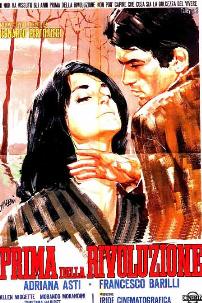Prima della rivoluzione
| Before the Revolution | |
|---|---|

Film poster
|
|
| Directed by | Bernardo Bertolucci |
| Written by | Bernardo Bertolucci Gianni Amico |
| Starring |
Adriana Asti Francesco Barilli |
| Music by | Ennio Morricone |
| Cinematography | Aldo Scavarda |
| Edited by | Roberto Perpignani |
| Distributed by | New Yorker Films (US, 1965) |
|
Release date
|
|
|
Running time
|
115 minutes |
| Country | Italy |
| Language | Italian |
Before the Revolution (Italian: Prima della rivoluzione) is a 1964 Italian romantic drama film directed by Bernardo Bertolucci. It stars Adriana Asti and Francesco Barilli and is centred on "political and romantic uncertainty among the youth of Parma".
The film, strongly influenced by the French New Wave, was shot between September and November, 1963. The shooting took place in Parma and its surroundings, one scene being filmed in the camera ottica (optical chamber) at the Sanvitale Fortress in Fontanellato. It premiered on 12 May 1964 at the 17th Cannes Film Festival during the International Critics' Week. Although the initial reception was only lukewarm, it has since become widely respected by critics, praised for its technical merit and music and is included in the book in the book 1001 Movies You Must See Before You Die, where Colin MacCabe refers to it as "the perfect portrait of the generation who were to embrace revolt in the late 1960s". A retrospective of the film was given at the BFI Southbank in London.
Parma, 1962. Fabrizio, a young student, warns of the difficulty of reconciling the middle class with the militancy of the Italian Communist Party. He remains traumatized by the death of his friend Agostino, who has drowned in the River Po. The arrival of Aunt Gina, an elegant young lady who lives in Milan, increases his worries. The aunt falls in love with him and Fabrizio reciprocates. But the aunt returns to Milan. Fabrizio, conscious of his own weakness and his inability to realize his aspirations and political ambitions, chooses to go along with convention. He gives up Gina and marries Clelia, a beautiful young girl who comes from a respectable family.
The title of the film is derived from a saying by Charles Maurice de Talleyrand-Périgord: "Only those who lived before the revolution knew how sweet life could be". The names of the characters in the film are the same as those in Stendhal's novel La Charteuse de Parme: the principal character and narrator, Fabrice, is now Fabrizio del Dongo, a young Marxist from a bourgeois family, who attracts his young aunt, Gina, now Gina Sanseverina, and finally marries a girl from a good family, Clélia, now Clelia Conti.
...
Wikipedia
